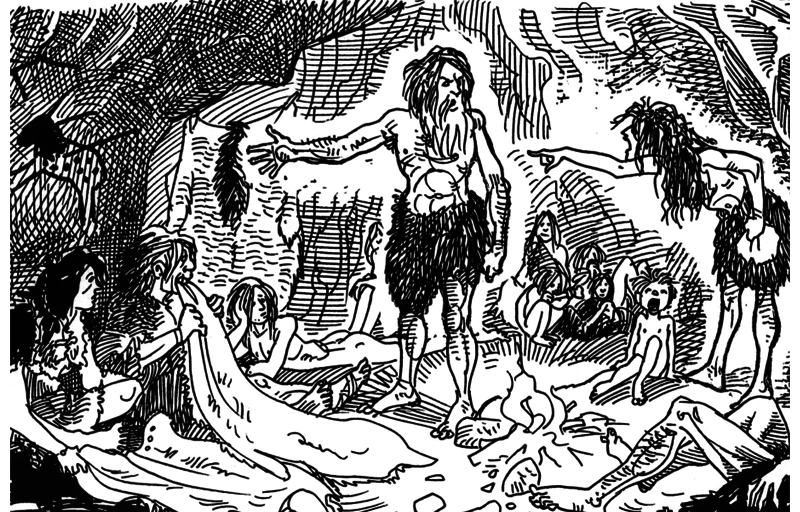Multi-Tribe Tribes
In its basic form, Tribes represents a single community of early humans or near-humans. They live together and know each other intimately. They are, after all, the only Real People in a world of disasters, horrifying sabertooths, and child-snatching hyenas! But what if the People are not the only people? What if there are . . . Others?
In a large enough group – for example, in a convention setting – multiple tribes can be created. The largest such meta-community that I have ever refereed was five tribes . . . slightly over 40 people. The game lasted about four hours, plus some setup. We decided that the tribes lived around a very large lake. Each tribe would be only a day's travel from at least one close neighbor, but would know their most distant neighbor only by rumor. They were all of the same species and shared a common language. The highly stylized countryside allowed tribes to co-exist in the same hunting grounds, if and when someone had to move . . . but two tribes hunted areas out very quickly. Things got interesting . . .
• One tribe had some successful years and tried to breed its way to victory; they were asking for rules to let their children breed as well. Then they had some bad years and most of their children starved. Cannibalism was discussed but did not occur.
• One tribe, made up entirely of male players, became warlike and tried to conquer a neighbor. There was a lot of blood and a few deaths, but no conquest; in an early tribal society, no one has the time to specialize in "soldier skills," and the peaceful tribes were just as adept at stalking and hunting as anyone else. It was clearly a few tens of thousands of years too soon for Empire. (Interestingly, we found that although the majority of the players were male, those playing women tended to be less martial; they had babies to care for! And even one female player in a group, at least in this very small sample, seemed to be enough to discourage really stupid levels of group aggressiveness.
• One cave-woman (played by a woman, as it happens) became unsatisfied with her lot in life. She did not want to be a gatherer and breeder, but her tribe wanted her in that role! So she ran away. The dice were kind, and she made it to a neighboring tribe . . . which valued her as a fertile female but was willing to let her hunt when not actually pregnant. After all, she had demonstrated both that she could handle the wilderness and that she would leave if unhappy! As referee, I gave the host tribe added victory points for successful exogamy.
• The imperial tribe, now reduced in numbers, heard about this and decided to steal some female children. It did not go well. The parents were on guard against hyenas, and the raiders were both noisier and less formidable. The survivors ran for home, but they had at least solved their tribe's problem with gender balance – one wounded warrior did not survive the return, and only two males were left!
• Two tribes developed religions, similar but different. One voted for prescriptive rules enforced by the stronger tribesfolk, while the other was peaceful and animistic. The other three had no official spiritual beliefs at all (perhaps it is just as well that this was before the advent of the Flying Spaghetti Monster). The spectators expected to see religious strife, but it didn't happen. Not in this generation, at least.
• Every one of the five tribes ended up as a group of mostly stable couples. Mostly. Because there was a referee, adultery was possible, and even the woman knew only who might be a child's father. This led to a lot of very mercenary discussions, in the bushes late at night, about who would feed the prospective babies!
• All five tribes survived and even grew a bit, though several of the original cave-folk died during the decades of play. The "imperials" were often on the edge of starvation. The most successful were the tribes that avoided drama and overbreeding.
All in all, it was great storytelling. The Tribes campaign is almost done, so please visit the Kickstarter today!

